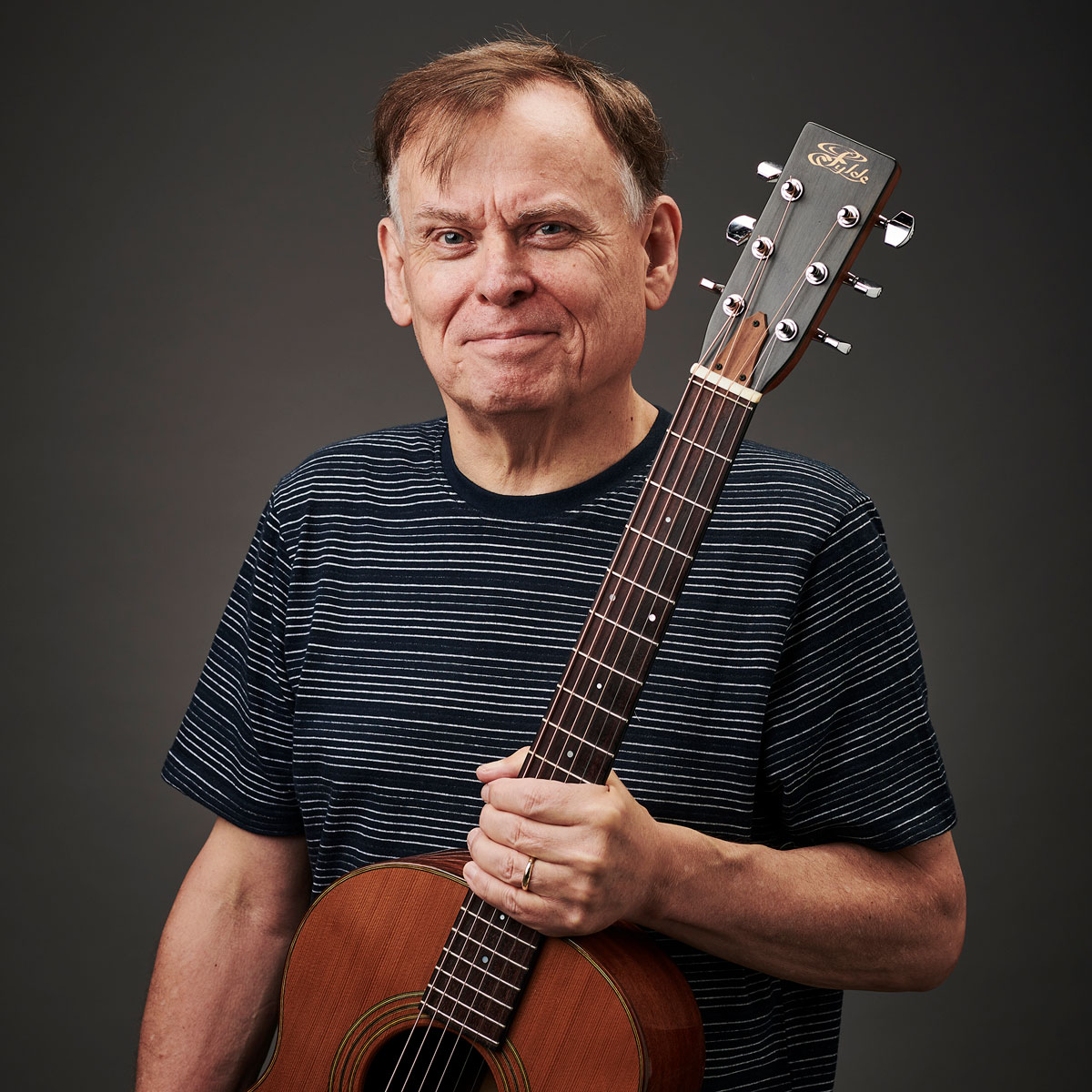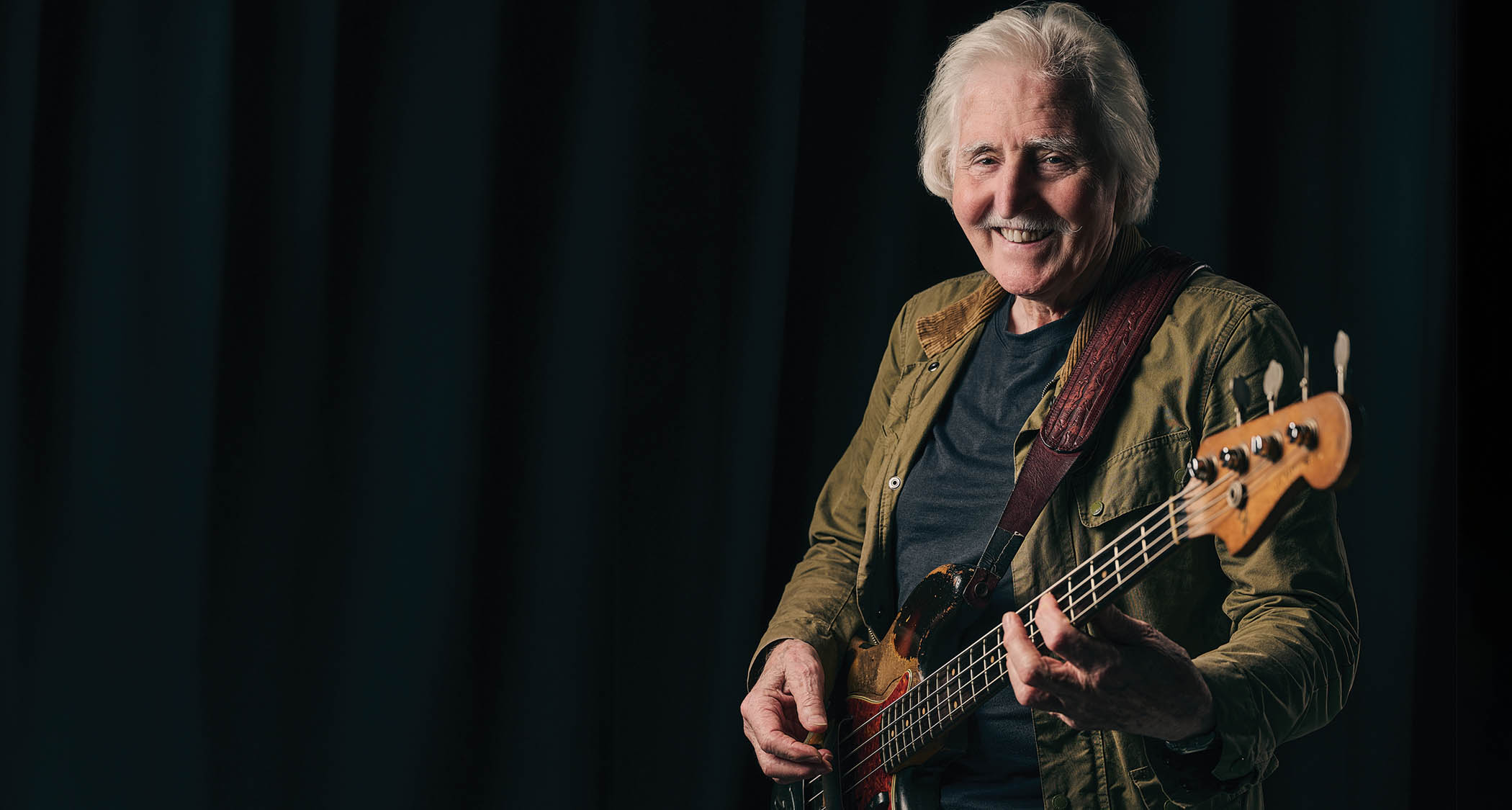Steve Hackett: ”The wounds never healed from my dad’s guitar. He said, ‘You’ll get calluses’… but I just had fingers that were bleeding!”
The former Genesis guitarist on the story of his career, from the mouth organ to prog-rock trailblazer

All the latest guitar news, interviews, lessons, reviews, deals and more, direct to your inbox!
You are now subscribed
Your newsletter sign-up was successful
It’s a time of reflection for Steve Hackett. With his autobiography, A Genesis In My Bed, on the bookshelves and a new live album retelling his old band Genesis’s most powerful prog statement with a version of Selling England By The Pound, the time seems right to look back and trace his musical journey to its starting point…
In The Beginning
“The mouth organ was a big deal for me, so from the age of about two my parents started buying me harmonicas because it was my favourite toy. My mum says I was playing tunes at two, but that can’t be possible. She said, ‘You used to play the same little tune over and over again…’ I do remember what was going on and it was trying to learn to isolate the notes so that I could move them around.
“So I think I spent forever just playing the lowest two notes – suck, blow and move around – and then for some reason one day I realised I could play a bunch of tunes. I don’t know if I was three or four, but certainly no older than that. I could play Scotland The Brave, Oh! Susanna and God Save The Queen. Suddenly I could play three tunes. ‘Look, mum!’”
Into The Shadows
“Guitar started to become important around the late 1950s. Maybe I’ve got the chronology wrong here, but I seem to remember the first single I bought was The Shadows’ Man Of Mystery and I thought it had an intriguing sound. I still think the melody is good – that descending sequence. I started buying just about every Shadows record I could, and many years later I met Hank Marvin and told him that was the first record I ever bought.
“He was very modest about it and very gentlemanly. It was refreshing to meet him. He was self-effacing and it was really quite extraordinary to meet my hero. The guitar sounded like that at that stage; guitars hadn’t learned to scream and sustain and rip and do all those slash and burn things until a little bit later.”
Wild Blues Yonder
“Bluesmen were doing this thing: Muddy Waters and Little Walter playing harmonica. Sonically, they’d already developed what rock was to do a decade later. They were way ahead of the white guys. I can’t stress the importance of that. Yet it was a marginalised music. I guess it’s not a case of being right, it’s a case of being right at the right time.
“But luckily, of course, due to The Beatles and The Stones mainly and the bluesmen and the blues bands that were to follow, a light was shone on those great luminaries themselves and many of them were able to forge second string careers. The very things that they were disqualified for having done at one point, suddenly they’re being applauded for. But isn’t that life?”
All the latest guitar news, interviews, lessons, reviews, deals and more, direct to your inbox!
The Green Party
“I went to see John Mayall at Eel Pie Island. It was John Mayall’s Bluesbreakers with Peter Green on lead guitar and he was totally thrilling for me as a kid. It was like being admitted into the inner sanctum of the magic temple where you could go, drink and smoke underage, and see these guys who were our older brothers doing exactly what I wanted to be able to do. Peter Green was in the forefront of that.
“My young life wouldn’t have been the same without hearing Peter Green. I loved him then and I love him now. I didn’t catch The Stones when they were developing – I started going to gigs from 1966 onwards so I’d missed out on that. I hadn’t seen Eric Clapton with John Mayall, but something that’s not far from my turntable is Blues Breakers With Eric Clapton.”
High Action Adventures
“My first guitar was my dad’s. He’d brought it back from Canada in the late 1950s and it was too big for me to get my arms around and it had a brutal action and heavy gauge strings. I started messing around with it when I was about 12 and I could play on the two bass strings and people were saying, ‘You can play guitar.’ I said, ‘Well, not really’, you know?
“I could play the first three frets on the two low strings. And then when I was 14 I was finally big enough to get my arms around it properly and my dad said, ‘Let me show you some chords.’ He showed me C, F and G7 and then we were away. That’s it. My first guitar lesson! That guitar gave way to many others, of course, over the years.”
Classical GAS
“Nylon guitar was something I was introduced to by a friend. ‘Wow, this is too easy,’ I thought, compared with the brutal action on the other thing. The wounds never healed from my dad’s guitar. He said, ‘You’ll get calluses…’ but it never happened, I just had fingers that were bleeding. After six months I thought, ‘Something’s wrong here.’
“Finally, it dawned when a friend bought a nylon-strung guitar for five quid at the Army & Navy store in Victoria. It felt like silk compared with barbed wire. Of course, he ended up putting steel strings on it. That lasted for a while and then it ripped the bridge up. Totally embarrassing.
“I used to go round to his house to see him. Really it was to play his guitar. ‘Is Ian in?’ I used to say. ‘No, he’s not back. Come on in anyway.’ ‘Do you mind if I play his guitar?’ Oh my God. You know. Embarrassing now, isn’t it? But hey, it had to be done…”
Boys In The Band
“I was trying to form my own band. We did cover versions and there might have been the odd original thing. Did a handful of gigs semi-pro. You start out and nobody claps, but by the time they’re all pissed, they’re all loving it and falling all over the place and it’s the same song you’re playing. You’re just recycling the same set because you’ve got a dearth of material.
“So the semi-pro scene was at the odd cricket ground, the odd sports thing, the odd pleasure boat up the Thames – and I guess after a few drinks the band would be in the same condition as the punters. You’d start to play better, or so you thought. Blues stuff, The Byrds, the odd Moody Blues song and quite a bit of harmonica, of course. I used to go between harmonica and guitar and singing.”
The Book Of Genesis
“There was a lot more practice than professionalism going on until I joined Quiet World. A year before Genesis I made an album with Quiet World and then Genesis was in 1970, after putting an advert in Melody Maker. The ad seemed to have secured me the gig really because I sounded like rock ’n’ roll’s answer to Churchill. ‘We shall fight on the beaches…’ I think you could tell it was written by someone who was serious to do something.
In the first year we got ourselves a Mellotron, which I thought was the most important move we could possibly do
“Pete [Gabriel] and Tony [Banks] came to the flat I was living in with my parents and my brother John. John and I played some things to them. Various duets. And we swapped instruments and what have you and there was a sufficiently good response.
“Pete was more forthright; Tony was more reserved. Pete said: ‘We’ll have to see whether you get on with our other guitarist, Mike.’ And that was how Mike Rutherford was sold to me – as the other guitarist rather than a bass player.”
A Life Of Cryme
“It was made apparent to me that Charisma Records were prepared to bankroll the band to keep them in equipment. So within a short space of time I was able to upgrade my equipment, get a Les Paul Custom and a Hiwatt stack, the odd fuzz box and a volume pedal. I think that was it – and I was very soon glorying in it.
“In the first year we got ourselves a Mellotron, which I thought was the most important move we could possibly do. The first gig was sometime in February and by the summer we were taking several months off in order to get to know each other and write together as a team. They were generous enough to take me onboard as a full-time writer and we made Nursery Cryme as a result of it.”
Going Solo
“I made an album in 1975 [Voyage Of The Acolyte], which did sufficiently well to tell me there was an audience out there for what I was doing, either with the Genesis guys or on my own, and in ’77 basically it was at the point where it was difficult for me to stay with the band.
“With the loss of Peter Gabriel, the band’s future was not assured and I felt there was a very good chance the band would not continue. And it wasn’t always easy to write with the band. Although I was engaged as a writer I wasn’t a founder member so it wasn’t easy to… get hold of the keys of the songwriting cabinet.
“I’m trying to put this diplomatically. I had written things. I’d written tunes as much as anybody, but whether they were going to be used or not was another matter.”
Revisiting The Past
“It has to be said from the early days that I wasn’t coming up with as much material as Pete, Mike and Tony. That was to change over time, but the percentage of my ideas that were being done didn’t vary with my output. So the choice was to have [unused songs] or bide my time in the group, but I wanted my ideas to be recorded.
“I had the encouragement of the success of the first album, but I think as the band was kind of closing down around me I felt that it was time to step out. Genesis was great for me and I still love the music, but I’m no longer hidebound by the internal politics.
“If I want to go and play the whole of Supper’s Ready I can. Or I can go and do the whole of Selling England By The Pound, because, for me, that seems the strongest contender out of all the Genesis albums and it can be done to what I think is a higher standard than I could have performed it at one time.”
Into The Present
“The equipment’s better now and there’s experience versus being a new face on the block. In terms of a young performer, it’s great to be young. You’ve got no baggage whatsoever. The press can admire you and adore you. On the other hand, later on, you’ve got to fight against the idea you’re past your sell-by date and you should have given up earlier.
I’d love to be able to go on record and say publicly at this point that Gary Brooker is a hugely gifted guy, both as a performer and also as a writer and arranger. People often overlook this
“But I think experience counts for something, so it’s songs of innocence and songs of experience – I do think I’m a better player and a better songwriter and various other things.
“I was having a similar conversation with Gary Brooker of Procol Harum a while back. He said to me: ‘I think I’ll be a better singer tomorrow than I was today.’ I realised that burning ambition was still there. Unlike those of us who think you don’t have to get any better and if you just keep doing it that’ll be great…
“I’d love to be able to go on record and say publicly at this point that [Gary is] a hugely gifted guy, both as a performer and also as a writer and arranger. People often overlook this when they mention the great prog bands of the late '60s.”
- Steve Hackett's new album, Under A Mediterranean Sky, is out on 22 January via Century Media.
With over 30 years’ experience writing for guitar magazines, including at one time occupying the role of editor for Guitarist and Guitar Techniques, David is also the best-selling author of a number of guitar books for Sanctuary Publishing, Music Sales, Mel Bay and Hal Leonard. As a player he has performed with blues sax legend Dick Heckstall-Smith, played rock ’n’ roll in Marty Wilde’s band, duetted with Martin Taylor and taken part in charity gigs backing Gary Moore, Bernie Marsden and Robbie McIntosh, among others. An avid composer of acoustic guitar instrumentals, he has released two acclaimed albums, Nocturnal and Arboretum.

